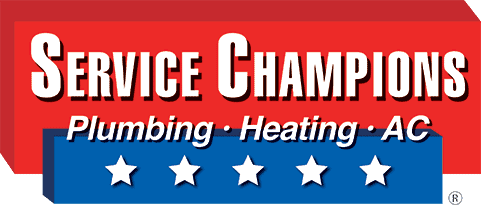The Top Benefits of Investing in Professional Air Filtration Service for Your Home
Maintaining your HVAC system is a critical part of good indoor air quality, but it’s not enough on its own – especially if anyone in your home suffers from allergies, asthma, or other respiratory conditions.
At Service Champions, we understand the importance of indoor air quality and how it can help you make your home a healthy, cozy, and comfortable place. One of the best options is an in-home air filtration system, which can filter out airborne pathogens and give you healthier air.
Learn more about the benefits of professional air filtration services for your home and how we can help.
Why Is Good Indoor Air Quality Important?
Over the past 40 years, engineers have designed buildings to have tighter envelopes – allowing less air exchange with the outdoors – to improve comfort and energy efficiency. This is great for the environment and energy bills, but the downside is that the indoors are optimized for germ transmission.
From cooking fumes to chemicals released by furniture, here are some common indoor pollutants:
- Tobacco smoke
- Household cleaning chemicals
- Cooking and heating
- New carpet, flooring, and upholstery
- Aging asbestos insulation
- Pressed-wood cabinetry and furniture
- Outdoor pollution coming inside, such as pesticides and wildfire smoke
- Mold and mildew
Short-term exposure to indoor air pollutants can cause immediate health effects, including:
- Eye, nose, and throat irritation
- Headaches
- Dizziness
- Fatigue
In the long term, exposure to indoor pollutants can contribute to more significant health problems like heart disease, cancer, cognitive deficits, and respiratory diseases.
Benefits of Air Filtration for Your Home
Here are some benefits of installing an air filtration system in your home:
Relieving the Symptoms of Asthma

About 25 million people – or 7.7% of the US population – have asthma according to the Centers for Disease Control and Prevention (CDC). People with asthma have inflamed bronchial tubes, which are irritated by pollutants like pet dander, pollen, and dust mites that circulate in the air.
No matter how clean your home is, these pollutants find their way in. Pollen particles come in with a breeze through an open window, stick to your clothes, or track in from the bottom of your shoes. They then circulate in the air, settling on furniture or recirculating in your HVAC system.
Dust mites are produced in every home and thrive in humidity. If you don’t have adequate ventilation and fresh air, it’s an excellent breeding ground for these creatures. Because they feed on dead skin cells, dust mites can multiply quickly and live in your upholstered furniture, bedding, and carpet.
Even if you vacuum often, some of them remain suspended in the air that you breathe. However, a high-efficiency particulate air (HEPA) filter with multi-layered mesh can capture dust mites, pollen, and pet dander floating in the air, keeping the air your HVAC system distributes fresher and cleaner.
Eliminating Harmful Chemicals
Closing the doors and windows in your home won’t block out all external pollutants – such as carbon monoxide and nitrogen dioxide. These gases are found in areas with high traffic, such as many parts of California, and get inside your home. Long-term exposure to carbon monoxide and nitrogen dioxide can compromise your health, including increasing the risk of dementia and Alzheimer’s disease.
Your area’s outdoor air pollution can influence how much indoor air pollution you breathe in. An air filter can help you minimize these pollutants in your home, particularly with HEPA filters.
Even if you live in an area with low outdoor pollution, there’s plenty that comes from inside your home. For example, regular household cleaners often contain toxic chemicals like phthalates, ammonia, and chlorine, which can contribute to serious health problems like certain types of cancer or cardiovascular diseases.
Air filters can cleanse these chemical contaminants from the air, minimizing the risk of long-term health effects. Activated carbon filters, for example, use a porous form of carbon to filter these chemicals and recycle fresh air back into the room.
Neutralizing Unpleasant Odors

Chemicals such as benzene, formaldehyde, and gasoline can off-gas at room temperatures. Chemicals like these are known as volatile organic compounds (VOCs), which are commonly found in air fresheners, aerosol sprays, paints, and upholstered furniture. The odor from VOCs, even at lower concentrations, can cause nausea, shortness of breath, and poor cognitive function.
HEPA filters and activated carbon filters are effective at trapping gases as well as particles, reducing the number of pollutants in your indoor air.
Reducing Airborne Diseases
Airborne diseases, such as COVID-19, the flu, and the common cold, are spread through tiny pathogens that float around in the air. That’s why one family member catching a cold in your household can quickly lead to the rest of the family getting sick. Everyone is breathing the same air – and the same bacteria and viruses.
HEPA filters are excellent at capturing bacteria and viruses. When you eliminate more of these pathogens from the air, you can better protect yourself and your family from them. This is especially important if you have family members with weakened immune systems or elderly people.
Improving Sleep Quality and Patterns

Indoor allergens like bacteria, fungi, and dust mites often trigger allergies or hay fever, leading to symptoms like a runny nose, congestion, sneezing, and watery eyes that disrupt your sleep.
Poor sleep has a lot of negative effects, including daytime drowsiness that affects your productivity the next day. Long-term sleep deprivation can cause chronic health problems, such as high blood pressure, obesity, diabetes, stroke, and cardiovascular disease.
Cleaner air contributes to a better night’s sleep by filtering out allergens that can compromise your sleep quality. It can also make it easier to maintain your mattress by removing allergens and fungi that float around in the air, ultimately settling into your mattress.
Removing Hazardous Radon
Radioactive elements like uranium are found in building materials. As these elements break down, they produce radon gas. Radon can also get into your home through small cracks or holes and build up in the air.
Though radon is colorless and odorless, it can cause serious health problems. Over time, this radioactive substance can increase the risk of lung cancer. According to the Environmental Protection Agency (EPA), radon causes about 21,000 lung cancer deaths in the US each year. It’s the second-leading cause of lung cancer deaths after cigarette smoke, and people who smoke and are exposed to radon have a 10 times greater risk of developing lung cancer than those who don’t smoke.
There are many steps you can take to test and reduce radon levels in your home, including installing air filtration systems with HEPA and activated carbon filters. These filters can track radon particles and gas, preventing them from circulating through your home.
Controlling Mold Growth

Mold thrives in areas with high humidity and low ventilation, such as bathrooms and bedrooms. Mold reproduces by releasing spores into the air, which then find their way into dark, moist corners of your home.
Exposure to a large number of mold spores may cause allergic symptoms like a runny nose, watery eyes, sneezing, itching, coughing, wheezing, difficulty breathing, headache, and fatigue. Repeated exposure can increase your sensitivity, leading to more severe allergic reactions.
Air filters with built-in dehumidifiers can help regulate humidity levels in the bedroom. By removing excess moisture from the air and capturing mold spores, they can not only remove some of the mold spores to prevent them from settling but create an inhospitable environment for mold to grow.
Eliminating Hazardous Asbestos Particles
Asbestos was common in roofing materials or insulation pipes from the 1940s to the 1960s. Many homes in the US that were built prior to the 1980s and haven’t been updated may contain asbestos in paint, insulation, floor tiles, cement board siding, roofing felt, and textured paint.
With age, these homes shed materials, spreading asbestos dust into the air. Asbestos is a dangerous carcinogen, but even short-term exposure can cause health problems like shortness of breath, persistent dry cough, chest pain, weight loss, and a dry, crackling sound in the lungs.
If you have asbestos in your home, it’s crucial to have it inspected and managed by a trained professional. However, HEPA air filters can help with capturing asbestos particles and minimizing the risk of associated health effects.
Keep Your Indoor Air Fresh and Clean
Your indoor air quality plays an important role in the health and comfort of you and your family. Air filtration systems that work with your HVAC system can improve your indoor air quality by capturing allergens and pollutants, reducing humidity, and filtering out household chemical fumes.
Are you looking to install a whole-home air filtration system to improve your indoor air quality? Contact the pros at Service Champions for an indoor air quality (IAQ) test and personalized indoor air quality solutions!

